.
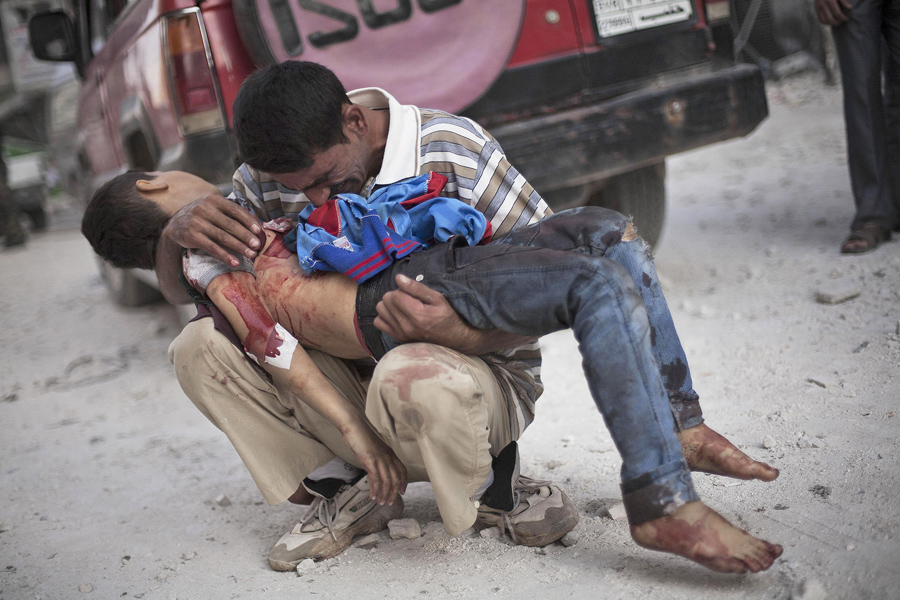
A Syrian man cries as he holds the lifeless body of his son, killed by the Syrian Army, near Dar El Shifa hospital in Aleppo: photo by Manu Brabo / AP, 3 October 2013
Woman mourning, Brentwood Street, Portland: photo by Austin Granger, 3 April 2012
((Nobody Answered Me))

SYRIA - A man reacts following a reported air strike by Syrian government forces in Bustan al-Qasr: image via baraa al halabi @baraaalhalabi, 5 June 2016

((Nobody Answered Me)) The artwork is inspired by a photograph taken by Baraa al-Halabi. By Miream Salameh #Syria: image via Kareem Hourani @kareem_ho, 8 June 2016
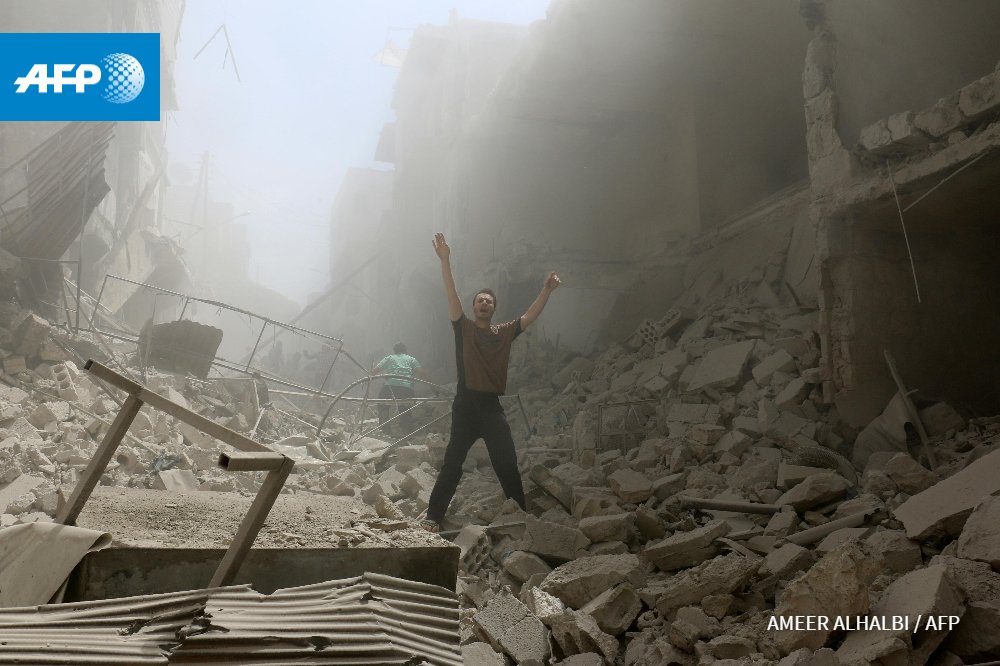
US, UN condemn Syria hospital bombing in war-ravaged Aleppo: image via AFP news agency @AFP, 28 April 2016
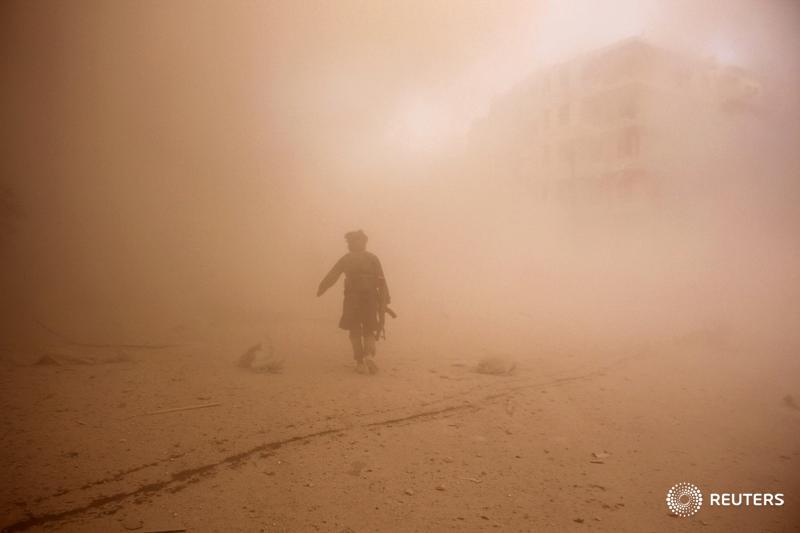
what the thunder said
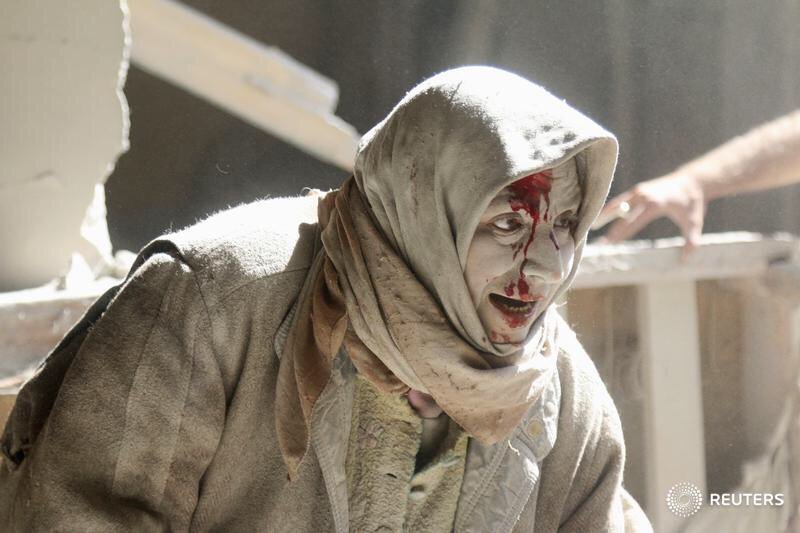
What is Aleppo? This is Aleppo: image via corinne perkins @corinne_perkins, 8 September 2016

What is Aleppo? This is Aleppo: image via corinne perkins @corinne_perkins, 8 September 2016

What is Aleppo? This is Aleppo: image via corinne perkins @corinne_perkins, 8 September 2016
Who is the third who walks always beside you?
When I count, there are only you and I together
But when I look ahead up the white road
There is always another one walking beside you
Gliding wrapt in a brown mantle, hooded
I do not know whether a man or a woman
-- But who is that on the other side of you?
When I count, there are only you and I together
But when I look ahead up the white road
There is always another one walking beside you
Gliding wrapt in a brown mantle, hooded
I do not know whether a man or a woman
-- But who is that on the other side of you?
What is that sound high in the air
Murmur of maternal lamentation
Who are those hooded hordes swarming
Over endless plains, stumbling in cracked earth
Ringed by the flat horizon only
Over endless plains, stumbling in cracked earth
Ringed by the flat horizon only
What is the city over the mountains
Cracks and reforms and bursts in the violet air
Falling towers
Cracks and reforms and bursts in the violet air
Falling towers
Jerusalem Athens Alexandria
Vienna London
Unreal
Vienna London
Unreal
T.S. Eliot: from What the Thunder said, in The Waste Land (1922)
Lightning storm and rainbow over New Mexico: photo by Darren Brown, 3 September 2012
24 hours of targeting #Aleppo by all weapon (cluster-navi-barrels-mortar-P

[Aleppo under bombardment]: image via zakaria abdelkafi @zakria_alkafi, 31 July 2016

[Aleppo under bombardment]: image via zakaria abdelkafi @zakria_alkafi, 19 August 2016
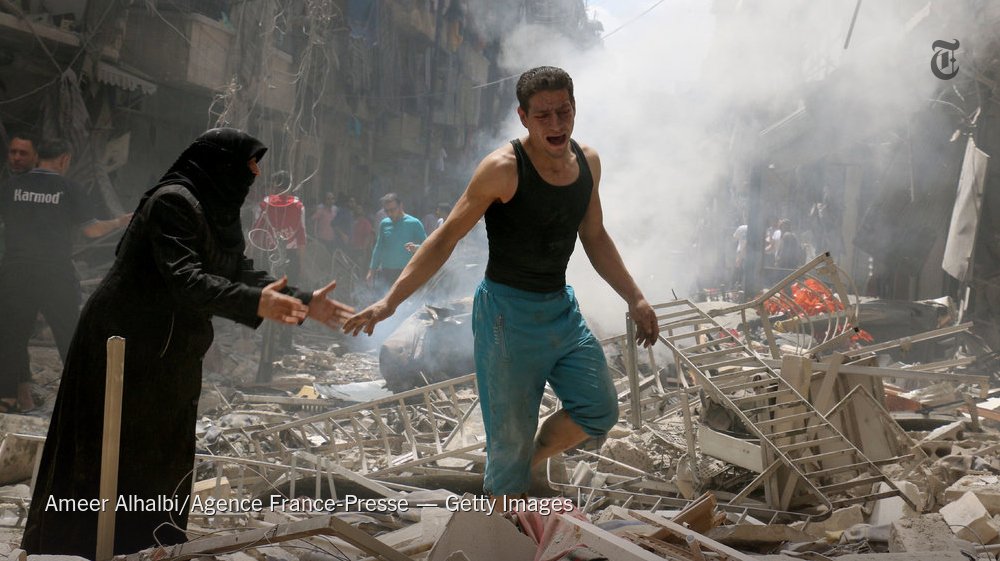
Airstrikes in Aleppo hit hospital: image via New York Times @nytimesworld, 28 April 2016
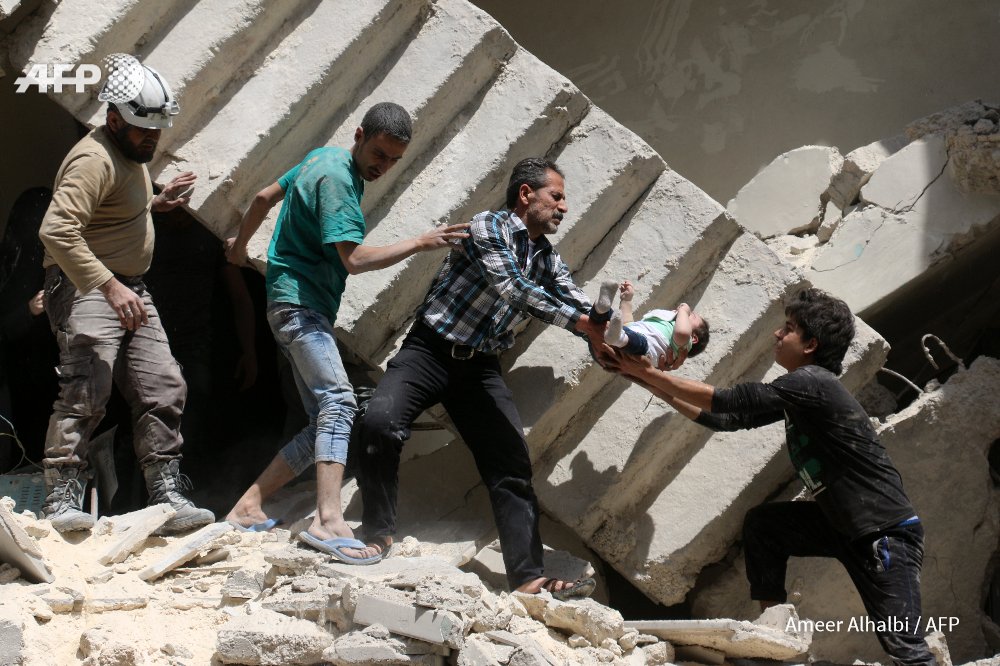
Following an air
strike in rebel-held area in Syrian city of Aleppo on April 28, 2016
#AFPphoto Ameer Alhalbi: image via BEHROUZ MEHRI @BEHROUZZZZ, 28 April
2016
Methar Lam, Afghanistan: Hospital Corpsman 2nd Class Alonzo Gonzales, Kilo Company, 3rd Battalion, 3rd Marine Regiment, walks through an alley in an operation to capture suspected Anti-Coalition Forces, in support of Operation Enduring Freedom: photo by Cpl. James L. Yarboro, U.S. Marines, April 6, 2005 (U.S. Government)
You cannot lead people to what is good; you can only lead them to some place or other. The good is outside the space of facts.
(1929)
Each morning you have to break through the dead rubble afresh so as to reach the living warm seed.
(1929)
(1929)
If
anyone should think he has solved the problem of life and feel like
telling himself that everything is quite easy now, he can see that he
is wrong just by recalling that there was a time when this "solution"
had not been discovered; but it must have been possible to live then too
and the solution which has now been discovered seems fortuitous in
relation to how things were then. And it is the same in the study of
logic. If there were a "solution" to the problems of logic (philosophy)
we should only need to caution ourselves that there was a time when
they had not been solved (and even at that time people must have known
how to live and think).
(1930)
Ludwig Wittgenstein, private notes, in Vermischte Bemerkungen (1977), edited by G.H. von Wright; translated by Peter Winch as Culture and Value, 1980
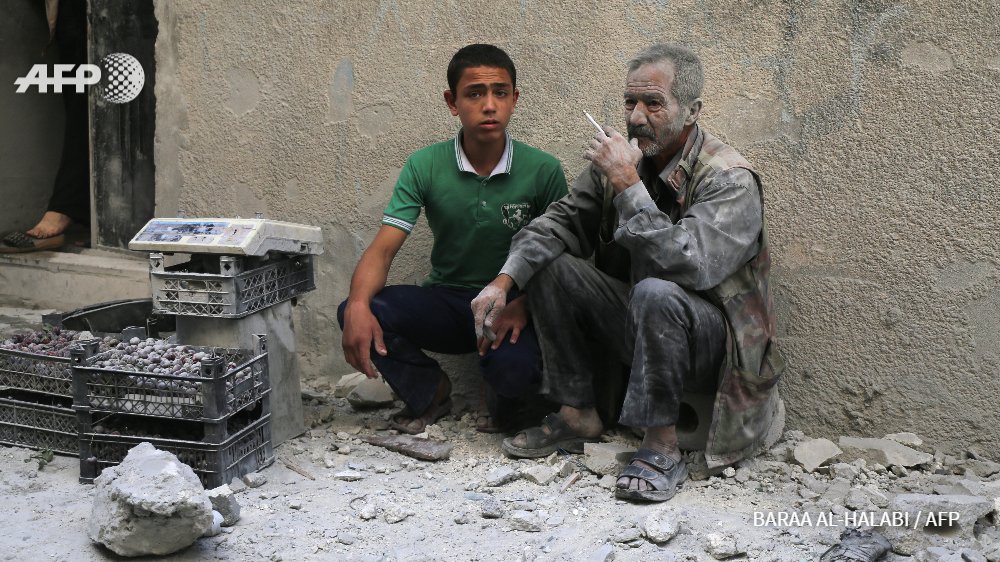
Un hombre cubierto de polvo tras un ataque aéreo atribuido a fuerzas del régimen cerca de Alepo @baraaalhalabi #AFP: image via Agence France-Presse @AFP, 31 May 2016

Assad planes bombed residential buildings in the city of Aleppo: image via baraa al halabi @baraa al halabi, 21 May 2016

This is what remains of his house which was destroyed by the Syrian regime aircraft in Aleppo Ph: Baraa Al Halabi: image via baraa al halabi @baraaalhalabi, 3 June 2016
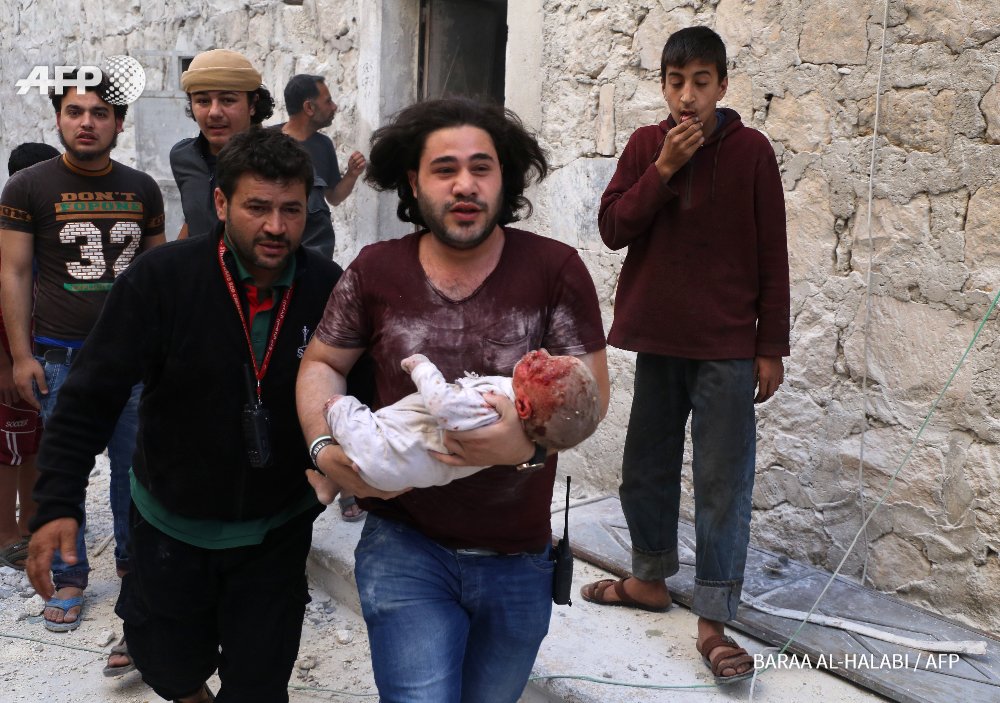

z
I once said, and perhaps rightly: The earlier culture will become a heap of rubble and finally a heap of ashes, but spirits will hover over the ashes.
(1930)
Ludwig Wittgenstein, private note. in Vermischte Bemerkungen (1977), edited by G.H. von Wright; translated by Peter Winch as Culture and Value, 1980

Prayer flags and Golden Gate Bridge, El Cerrito, California: photo by efo, 29 December 2010
The horrors of hell can be experienced within a single day; that's plenty of time.
(1937)
Ludwig Wittgenstein, private note. in Vermischte Bemerkungen (1977), edited by G.H. von Wright; translated by Peter Winch as Culture and Value, 1980

Bloodied bodies lie strewn on a street after Syrian regime helicopters allegedly dropped barrel bombs on an opposition-held district in the northern city of Aleppo, killing at least 20 people, including several children, according to the Syrian Observatory for Human Rights.: photo by
(1944)
Ludwig Wittgenstein, private note, in Vermischte Bemerkungen (1977), edited by G.H. von Wright; translated by Peter Winch as Culture and Value, 1980
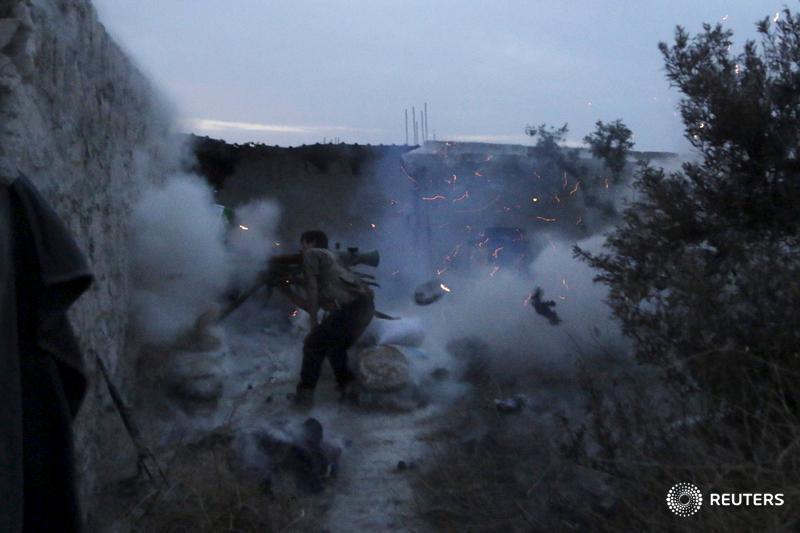
I sit astride life like a bad rider on a horse. I only owe it to the horse's good nature that I am not thrown off at this very moment.
(1939-1940)
Ludwig Wittgenstein, private note, in Vermischte Bemerkungen (1977), edited by G.H. von Wright; translated by Peter Winch as Culture and Value, 1980

cv
No cry of torment can be greater than the cry of one man.
Or, again, no torment can be greater than what a single human being may suffer.
A man is capable of infinite torment therefore, and so he too can stand in need of infinite help.
(circa 1944)
(1930)
Ludwig Wittgenstein, private notes, in Vermischte Bemerkungen (1977), edited by G.H. von Wright; translated by Peter Winch as Culture and Value, 1980

Un hombre cubierto de polvo tras un ataque aéreo atribuido a fuerzas del régimen cerca de Alepo @baraaalhalabi #AFP: image via Agence France-Presse @AFP, 31 May 2016

Assad planes bombed residential buildings in the city of Aleppo: image via baraa al halabi @baraa al halabi, 21 May 2016

This is what remains of his house which was destroyed by the Syrian regime aircraft in Aleppo Ph: Baraa Al Halabi: image via baraa al halabi @baraaalhalabi, 3 June 2016

SYRIA - A Syrian man carries a severely wounded baby following a barrel bomb attack near Aleppo. By @baraaalhalabi: image via Frédérique Geffard @fgeffardAFP, 2 June 2016

Photo how the Assad regime destroyed his home: image via baraa al halabi @baraaalhalabi, 1 June 2016
I once said, and perhaps rightly: The earlier culture will become a heap of rubble and finally a heap of ashes, but spirits will hover over the ashes.
(1930)
Ludwig Wittgenstein, private note. in Vermischte Bemerkungen (1977), edited by G.H. von Wright; translated by Peter Winch as Culture and Value, 1980
Prayer flags and Golden Gate Bridge, El Cerrito, California: photo by efo, 29 December 2010
The horrors of hell can be experienced within a single day; that's plenty of time.
(1937)
Ludwig Wittgenstein, private note. in Vermischte Bemerkungen (1977), edited by G.H. von Wright; translated by Peter Winch as Culture and Value, 1980

Bloodied bodies lie strewn on a street after Syrian regime helicopters allegedly dropped barrel bombs on an opposition-held district in the northern city of Aleppo, killing at least 20 people, including several children, according to the Syrian Observatory for Human Rights.: photo by
Baraa Al-Halabi / AFP, 16 June
2014
If in life we are surrounded by death, so too in the health of our intellect we are surrounded by madness. (1944)
Ludwig Wittgenstein, private note, in Vermischte Bemerkungen (1977), edited by G.H. von Wright; translated by Peter Winch as Culture and Value, 1980

What is Aleppo? This is Aleppo: image via corinne perkins @corinne_perkins, 8 September 2016
I sit astride life like a bad rider on a horse. I only owe it to the horse's good nature that I am not thrown off at this very moment.
(1939-1940)
Ludwig Wittgenstein, private note, in Vermischte Bemerkungen (1977), edited by G.H. von Wright; translated by Peter Winch as Culture and Value, 1980

The bodies of two Syrian children lie in the
rubble of a residential building hit by an explosives-filled
barrel dropped by a government forces helicopter: photo by Khaled Khatib / AFP, 18 March 2014
No cry of torment can be greater than the cry of one man.
Or, again, no torment can be greater than what a single human being may suffer.
A man is capable of infinite torment therefore, and so he too can stand in need of infinite help.
(circa 1944)
Ludwig Wittgenstein, private notes, in Vermischte Bemerkungen (1977), edited by G.H. von Wright; translated by Peter Winch as Culture and Value, 1980

Winchester Bay, Oregon: photo by Austin Granger, 24 October 2013

Black tarp, Winchester Bay, Oregon: photo by Austin Granger, 19 October 2013
Ludwig Wittgenstein, private note, in Vermischte Bemerkungen (1977), edited by G.H. von Wright; translated by Peter Winch as Culture and Value, 1980

Along the Willamette River, Oregon City: photo by Austin Granger, 7 November 2013

Air Museum, Tillamook, Oregon: photo by Austin Granger, 3 April 2012

We will stay constant in the Syrian revolution to overthrow the regime aleppo: image via baraa al halabi @baraahalabi, 18 June 2016
There are no more restaurants, no more leisurely distractions, no more happiness. Several times a day, you hear Bashar al-Assad's army planes passing overhead. You are never safe.
Each moment of each day, when you walk in the street, when you're at home or at the mosque, you risk death. You can face a barrel bomb at any minute.
One day I was sitting and talking with someone, and the next day I learned that he was dead.
In 2011, I was 19 years old and studying computer science at the University of Aleppo. I had never taken photos, but when the revolution began, I bought a camera and began filming and photographing anti-regime protests for local media.
I was arrested during a protest and spent one month in prison. When I got out, I began taking photos for the Aleppo Media Centre (AMC) in the part of city controlled by the free Syrian army. In 2014, I got in touch with AFP through a friend, and they began buying my photos.

A man carries his sister, who was injured in a barrel-bomb attack by government forces against a rebel-held district of Aleppo: photo by Baraa Al-Halabi/AFP, 3 June 2014
Recently, I won a prize at the Fujairah international photo contest for the image above. I took it on June 3, 2014. It was presidential election day, when Assad won a new term with nearly 90 percent of the votes. While people went to cast their ballots in parts of Aleppo controlled by the regime, the war on opposition-held areas just a few metres away continued.
I was in my car when a bomb went off near me. In front of me, through the dust, by a damaged mosque, I saw this young man running towards a truck with rescue workers carrying his sister in his arms. She looked badly injured or possibly dead... I never found out what happened to the two of them.
I am proud to have won this FIPCOM award, but I hope people will see beyond this photo.
Syria is more than images of bombs and suffering. It is a place where people want freedom, where people want to build their country. With time, I learned to love my new profession. But photography isn't simply a hobby for me. It's a way to show the world what exactly is going on here.
If I stop, if my friends stop, the regime will simply launch more barrel bombs at Aleppo, and nobody will know.
I live and work in opposition-held Aleppo, so my movements remain relatively free. There is intermittent internet access. We can buy SIM cards for $2, and get WiFi on computers connected to generators or car batteries. At AMC, we organised a sort of monitoring system on Facebook. We have correspondents in different parts of the country who can alert us when something happens. So when we hear of a barrel bomb explosion, we can all go out to do our work.
Sometimes we are hardened by our work, but there are still moments when I cannot bear to take a photo, when what I see is unbearable. For example, when a regime barrel bomb strike in May killed more than 70 people at a market in Aleppo, I couldn't bring myself to take photos. I couldn't bear the carnage I was seeing, all I could do was sit down and weep.
But then my friends and colleagues at AMC helped me back up, and encouraged me to continue. So I began working again.
Sometimes people are hostile towards me as a photographer. When there is a deadly attack and people are there digging out dead bodies surrounded by people covered in blood, some don't want photographers there. They might think that it's because of us that things like this happen. We draw attention to them and to their neighbourhood. When I'm faced with sentiments like this, I try to clear out as soon as possible.
The people of Aleppo love winter because it brings the clouds. It makes it harder for Assad's planes to fly and to drop bombs on us.
The noise of planes haunts us. They come at the same time almost every day -- either in the morning or in the evening.
During the day, we have a few seconds to predict where the barrel bomb will fall. But during the night it's a whole different story, it's much more dangerous. It's dark and there's no way to know where the bomb will hit.
The regime also uses "elephant rockets", or bombs with rockets attached to them. When they're launched they make a mournful trumpet sound -- giving them their name -- and it's extremely difficult to predict where they will land.
Before, I went to Turkey every two to three months just so I could breathe. But the border closed recently and it's increasingly difficult to cross into Turkey. Now I have to pay a smuggler around 400 dollars just to get through. So I no longer have a safe place to go to regain my bearings and catch my breath.
Now I'm in France to receive the FIPCOM prize, but I'm constantly thinking about my wife, my family and my friends who stayed in Aleppo and risk their lives every day. The war is always on my mind.

Moments after a government air strike against Aleppo: photo by Baraa Al-Halabi/AFP, 15 July 2014
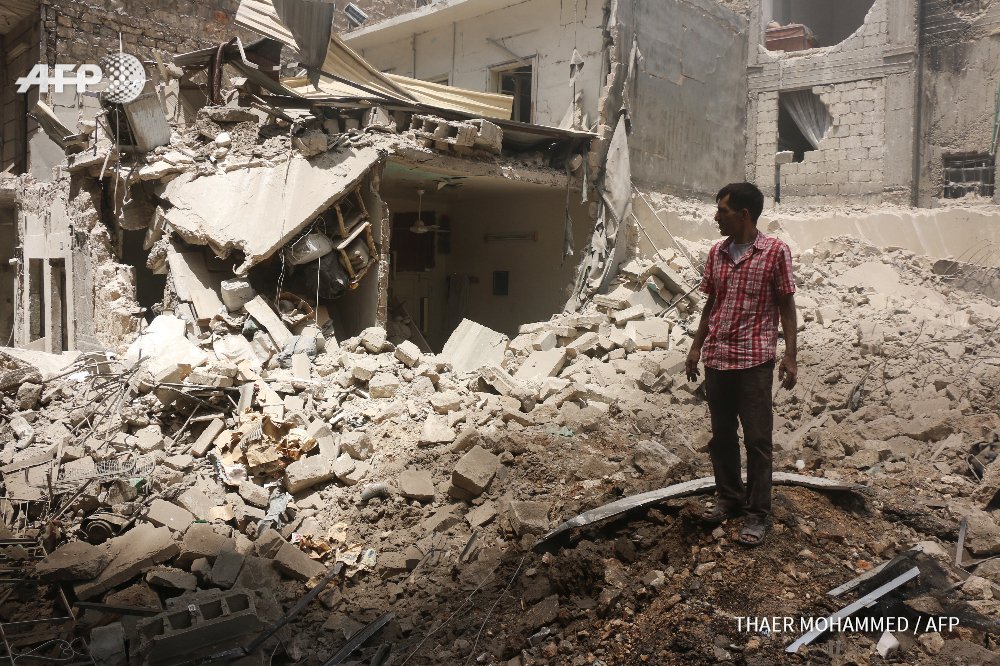
SYRIA - A man stands on the rubble of building following air strikes by gov. forces in Aleppo. By Thaer Mohammed #AFP: image via Frédérique Geffard @fgeffardAFP, 8 June 2016

A building opposite a clinic in Aleppo on Wednesday after airstrikes by Syrian government forces: photo by Karam Al-Masri/Agence France-Presse, 8 June 2016

A building opposite a clinic in Aleppo on Wednesday after airstrikes by Syrian government forces: photo by Karam Al-Masri/Agence France-Presse, 8 June 2016

Residents run from a fire at a gasoline and oil shop in Aleppo's Bustan Al-Qasr neighbourhood. Witnesses said the fire was caused by a bullet fired by a sniper loyal to Syrian President Bashar al-Assad at the Karaj al-Hajez crossing, a passageway separating Aleppo's Bustan al-Qasr, which is under the rebels' control and Al-Masharqa neighborhood, an area controlled by the regime.: photo by Haleem Al-Halabi / Reuters, 20 October 2013
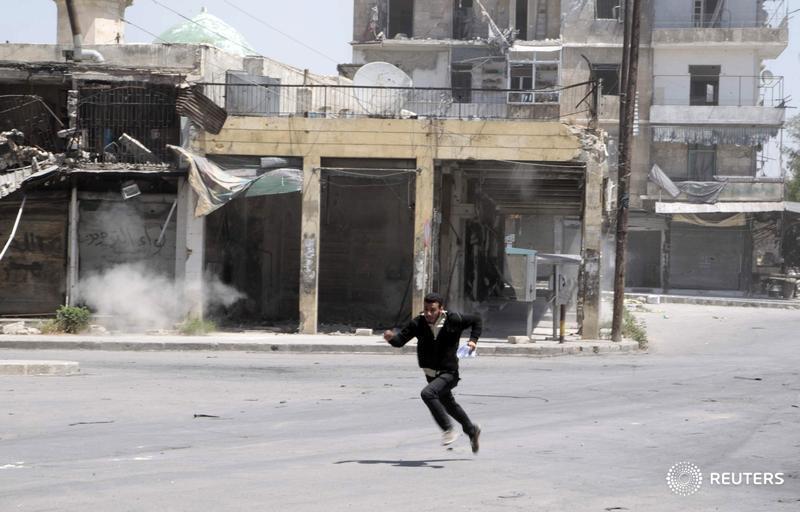
What is Aleppo? This is Aleppo: image via corinne perkins @corinne_perkins, 8 September 2016
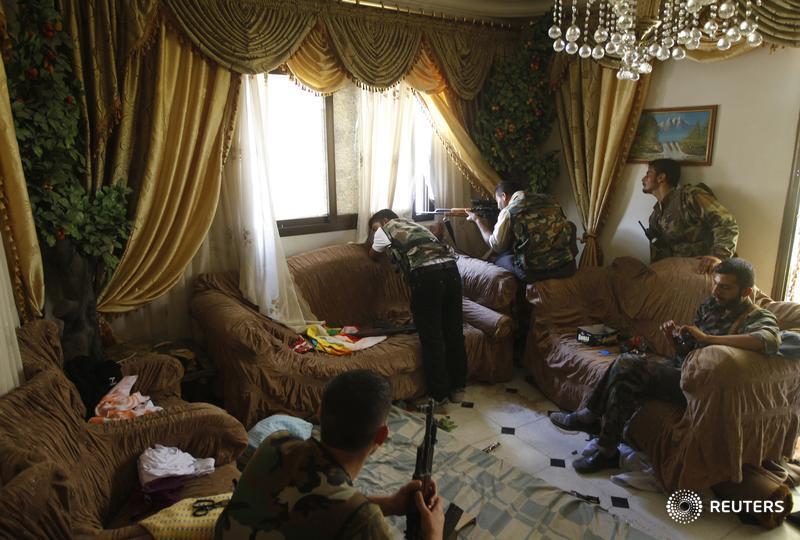
What is Aleppo? This is Aleppo: image via corinne perkins @corinne_perkins, 8 September 2016
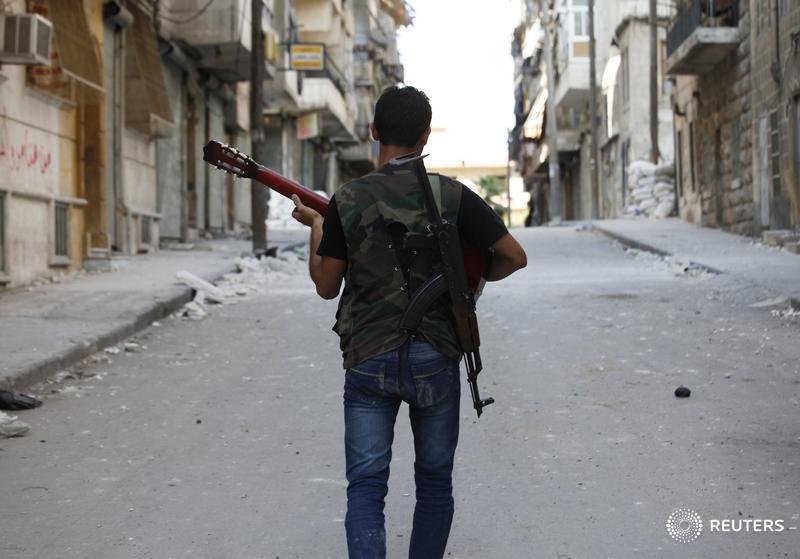
South Korean and US marines move to a position during a re-enactment of the Incheon
landing to mark the 66th anniversary of the start of Operation Chromite,
the battle that turned the tide in the Korean War, in the western port
city of Incheon: photo by Jung Yeon-Jejung/AFP, 9 September 2016
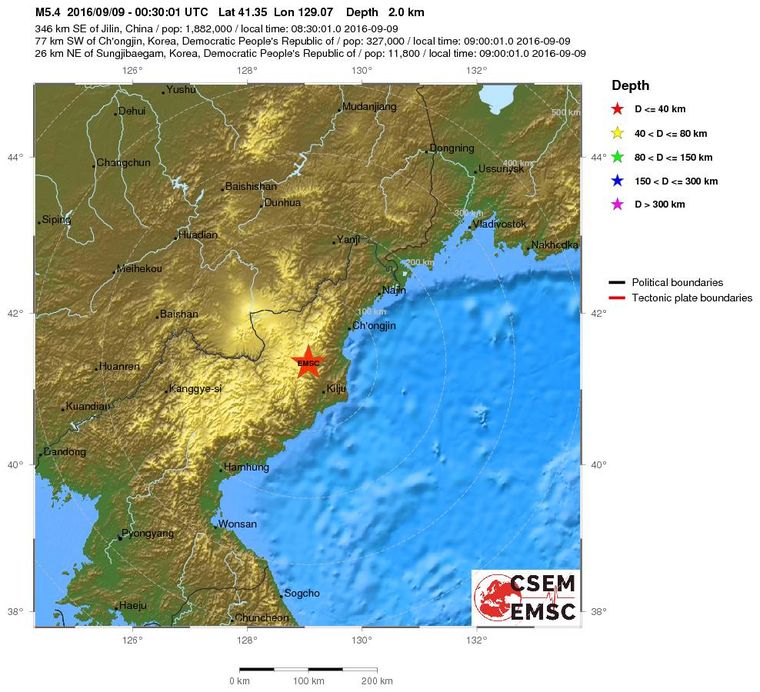
#NorthKorea blast measured at least 20 to 30 kilotons: Analyst: image via CONCEPT @ConceptGrp 8 September 2016
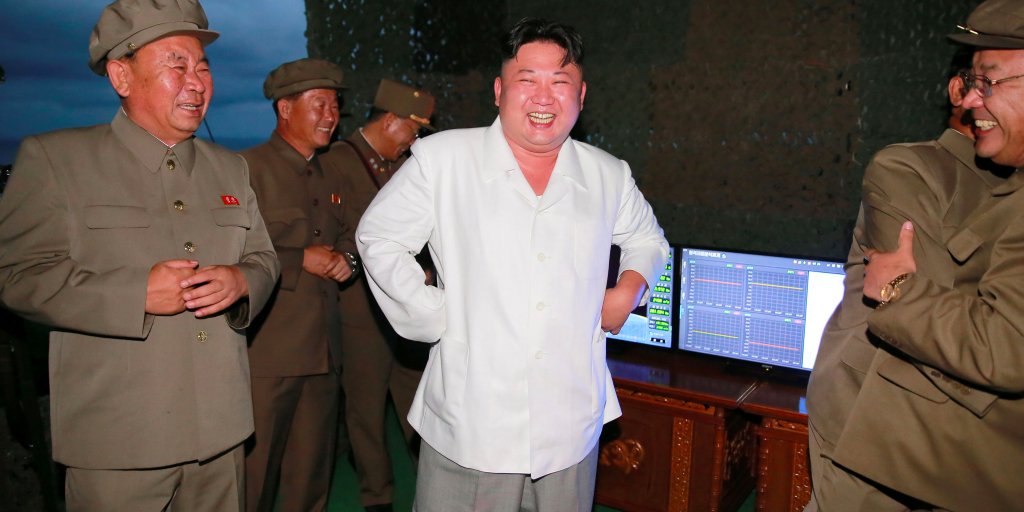
Looks like #NorthKorea may have conducted a nuclear test (again): image via Business Insider Verified account @businessinsider, 8 September 2016
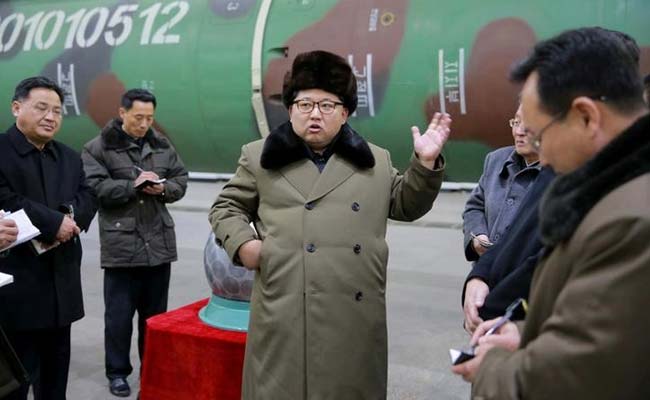
#NorthKorea appears to conduct fifth nuclear test as regime celebrates national holiday: image via NDTV Verified account @ndtv, 8 September 2016
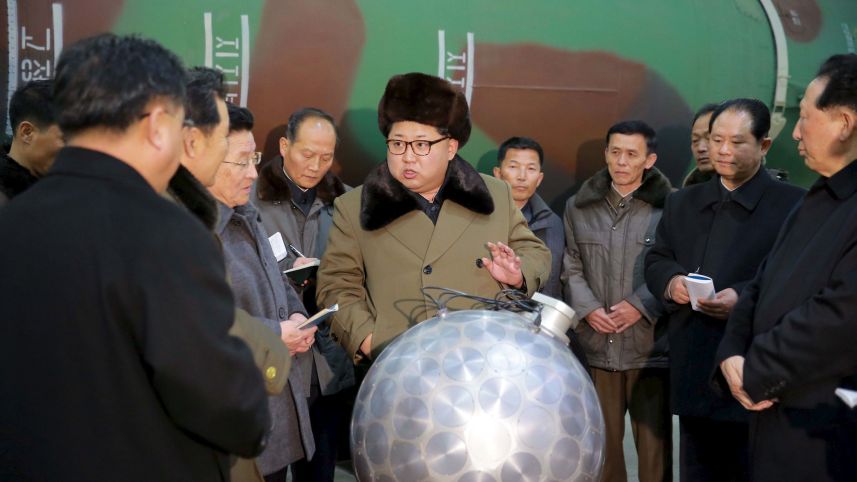
#NorthKorea carries out fifth, biggest nuclear test, drawing int'l condemnation: image via Haaretz Verified account @haaretzcom, 8 September 2016
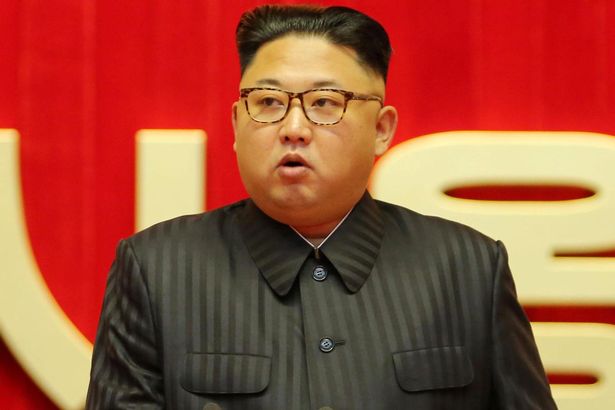
#NorthKorea Executes Two Officials ‘With Anti-Aircraft Gun’: image via Red Pepper Uganda Verified account @RedPepperUG, 30 August 2016

#NorthKorea has forbidden people from making sarcastic comments about Kim Jong-Un or his totalitarian regime in their everyday conversations: photo by Washington Post, 8 September 2016
An aerial view of the Statue of Liberty. New York City is preparing to mark the 15th anniversary of the September 11 terrorist attacks: photo by Drew Angerer, 9 September 2016
 .
.
An aerial view of the Statue of Liberty. New York City is preparing to mark the 15th anniversary of the September 11 terrorist attacks: photo by Drew Angerer, 9 September 2016

Debris covers a street and flames rise from a building following an air strike by Syrian government forces during the Friday prayer in the Sukkari neighborhood of the northern city of Aleppo: photo by Baraa Al-Halabi / AFP, 7 March 2014

Winchester Bay, Oregon: photo by Austin Granger, 24 October 2013
It
is very remarkable that we should be inclined to think of civilization
-- houses, trees, cars, etc. -- as separating man from his origins, from
what is lofty and eternal, etc. Our civilized environment, along with
its trees and plants, strikes us as though it were cheaply wrapped in
cellophane and isolated from everything great, from God, as it were.
That is a remarkable picture that intrudes on us.
(1946)
Ludwig Wittgenstein, private note, in Vermischte Bemerkungen (1977), edited by G.H. von Wright; translated by Peter Winch as Culture and Value, 1980
(1946)
Ludwig Wittgenstein, private note, in Vermischte Bemerkungen (1977), edited by G.H. von Wright; translated by Peter Winch as Culture and Value, 1980
Black tarp, Winchester Bay, Oregon: photo by Austin Granger, 19 October 2013
Perhaps one day this civilization will produce a culture.
...When
that happens there will be a real history of the discoveries of the
18th, 19th and 20th Centuries, which will be deeply interesting.
(1947)
(1947)
Ludwig Wittgenstein, private note, in Vermischte Bemerkungen (1977), edited by G.H. von Wright; translated by Peter Winch as Culture and Value, 1980
Along the Willamette River, Oregon City: photo by Austin Granger, 7 November 2013
Air Museum, Tillamook, Oregon: photo by Austin Granger, 3 April 2012
what is aleppo? what is history?

We will stay constant in the Syrian revolution to overthrow the regime aleppo: image via baraa al halabi @baraahalabi, 18 June 2016
The war is always on my mind
Working in a town turned into a cemetery: Baraa Al-halabi with Roland de Courson and Janine Haidar in Paris, AFP Correspondent, 18 September 2015
PARIS, September 18, 2015 - In Aleppo, almost every public garden has turned into a cemetery.
There are no more restaurants, no more leisurely distractions, no more happiness. Several times a day, you hear Bashar al-Assad's army planes passing overhead. You are never safe.
Each moment of each day, when you walk in the street, when you're at home or at the mosque, you risk death. You can face a barrel bomb at any minute.
One day I was sitting and talking with someone, and the next day I learned that he was dead.
In 2011, I was 19 years old and studying computer science at the University of Aleppo. I had never taken photos, but when the revolution began, I bought a camera and began filming and photographing anti-regime protests for local media.
I was arrested during a protest and spent one month in prison. When I got out, I began taking photos for the Aleppo Media Centre (AMC) in the part of city controlled by the free Syrian army. In 2014, I got in touch with AFP through a friend, and they began buying my photos.

A man carries his sister, who was injured in a barrel-bomb attack by government forces against a rebel-held district of Aleppo: photo by Baraa Al-Halabi/AFP, 3 June 2014
Recently, I won a prize at the Fujairah international photo contest for the image above. I took it on June 3, 2014. It was presidential election day, when Assad won a new term with nearly 90 percent of the votes. While people went to cast their ballots in parts of Aleppo controlled by the regime, the war on opposition-held areas just a few metres away continued.
I was in my car when a bomb went off near me. In front of me, through the dust, by a damaged mosque, I saw this young man running towards a truck with rescue workers carrying his sister in his arms. She looked badly injured or possibly dead... I never found out what happened to the two of them.
I am proud to have won this FIPCOM award, but I hope people will see beyond this photo.
Syria is more than images of bombs and suffering. It is a place where people want freedom, where people want to build their country. With time, I learned to love my new profession. But photography isn't simply a hobby for me. It's a way to show the world what exactly is going on here.
If I stop, if my friends stop, the regime will simply launch more barrel bombs at Aleppo, and nobody will know.
I live and work in opposition-held Aleppo, so my movements remain relatively free. There is intermittent internet access. We can buy SIM cards for $2, and get WiFi on computers connected to generators or car batteries. At AMC, we organised a sort of monitoring system on Facebook. We have correspondents in different parts of the country who can alert us when something happens. So when we hear of a barrel bomb explosion, we can all go out to do our work.
Sometimes we are hardened by our work, but there are still moments when I cannot bear to take a photo, when what I see is unbearable. For example, when a regime barrel bomb strike in May killed more than 70 people at a market in Aleppo, I couldn't bring myself to take photos. I couldn't bear the carnage I was seeing, all I could do was sit down and weep.
But then my friends and colleagues at AMC helped me back up, and encouraged me to continue. So I began working again.
Sometimes people are hostile towards me as a photographer. When there is a deadly attack and people are there digging out dead bodies surrounded by people covered in blood, some don't want photographers there. They might think that it's because of us that things like this happen. We draw attention to them and to their neighbourhood. When I'm faced with sentiments like this, I try to clear out as soon as possible.
The people of Aleppo love winter because it brings the clouds. It makes it harder for Assad's planes to fly and to drop bombs on us.
The noise of planes haunts us. They come at the same time almost every day -- either in the morning or in the evening.
During the day, we have a few seconds to predict where the barrel bomb will fall. But during the night it's a whole different story, it's much more dangerous. It's dark and there's no way to know where the bomb will hit.
The regime also uses "elephant rockets", or bombs with rockets attached to them. When they're launched they make a mournful trumpet sound -- giving them their name -- and it's extremely difficult to predict where they will land.
Before, I went to Turkey every two to three months just so I could breathe. But the border closed recently and it's increasingly difficult to cross into Turkey. Now I have to pay a smuggler around 400 dollars just to get through. So I no longer have a safe place to go to regain my bearings and catch my breath.
Now I'm in France to receive the FIPCOM prize, but I'm constantly thinking about my wife, my family and my friends who stayed in Aleppo and risk their lives every day. The war is always on my mind.

Moments after a government air strike against Aleppo: photo by Baraa Al-Halabi/AFP, 15 July 2014

SYRIA - A man stands on the rubble of building following air strikes by gov. forces in Aleppo. By Thaer Mohammed #AFP: image via Frédérique Geffard @fgeffardAFP, 8 June 2016

A building opposite a clinic in Aleppo on Wednesday after airstrikes by Syrian government forces: photo by Karam Al-Masri/Agence France-Presse, 8 June 2016

A building opposite a clinic in Aleppo on Wednesday after airstrikes by Syrian government forces: photo by Karam Al-Masri/Agence France-Presse, 8 June 2016

Residents run from a fire at a gasoline and oil shop in Aleppo's Bustan Al-Qasr neighbourhood. Witnesses said the fire was caused by a bullet fired by a sniper loyal to Syrian President Bashar al-Assad at the Karaj al-Hajez crossing, a passageway separating Aleppo's Bustan al-Qasr, which is under the rebels' control and Al-Masharqa neighborhood, an area controlled by the regime.: photo by Haleem Al-Halabi / Reuters, 20 October 2013

What is Aleppo? This is Aleppo: image via corinne perkins @corinne_perkins, 8 September 2016

What is Aleppo? This is Aleppo: image via corinne perkins @corinne_perkins, 8 September 2016

What is Aleppo? This is Aleppo: image via corinne perkins @corinne_perkins, 8 September 2016
not a joke?

#NorthKorea blast measured at least 20 to 30 kilotons: Analyst: image via CONCEPT @ConceptGrp 8 September 2016

Looks like #NorthKorea may have conducted a nuclear test (again): image via Business Insider Verified account @businessinsider, 8 September 2016

#NorthKorea appears to conduct fifth nuclear test as regime celebrates national holiday: image via NDTV Verified account @ndtv, 8 September 2016

#NorthKorea carries out fifth, biggest nuclear test, drawing int'l condemnation: image via Haaretz Verified account @haaretzcom, 8 September 2016

#NorthKorea Executes Two Officials ‘With Anti-Aircraft Gun’: image via Red Pepper Uganda Verified account @RedPepperUG, 30 August 2016

#NorthKorea has forbidden people from making sarcastic comments about Kim Jong-Un or his totalitarian regime in their everyday conversations: photo by Washington Post, 8 September 2016
An aerial view of the Statue of Liberty. New York City is preparing to mark the 15th anniversary of the September 11 terrorist attacks: photo by Drew Angerer, 9 September 2016
An aerial view of the Statue of Liberty. New York City is preparing to mark the 15th anniversary of the September 11 terrorist attacks: photo by Drew Angerer, 9 September 2016

Debris covers a street and flames rise from a building following an air strike by Syrian government forces during the Friday prayer in the Sukkari neighborhood of the northern city of Aleppo: photo by Baraa Al-Halabi / AFP, 7 March 2014

People inspect damage at a site hit by barrel bombs dropped by forces loyal to Syria's
President Bashar al-Assad in Aleppo's district of al-Sukari: photo by Hosam Katan / Reuters. 7 March 2014

A fighter with the Free Syria Army (FSA) fires his weapon during heavy clashes with government forces in Izza neighbourhood of the embattled northern city of Aleppo: photo by Zac Baillie / AFP, 9 September 2012


Civilians walk near upright buses barricading a
street, which serve as protection from snipers loyal to Syria's
President Bashar al-Assad, in Aleppo's rebel-controlled Bustan al-Qasr
neighborhood: photo by Ammar Abdullah / Reuters, 21 March 2015


A fighter with the Free Syria Army (FSA) fires his weapon during heavy clashes with government forces in Izza neighbourhood of the embattled northern city of Aleppo: photo by Zac Baillie / AFP, 9 September 2012

The body of a 7 year old boy killed by a Syrian
Army sniper lies in Dar Al Shifa hospital in Aleppo: photo by
Manu Brabo / AP, 20 September 2012
Paramilitary policemen listen to the officer addressing them in the Forbidden City in Beijing, China: photo by Thomas Peter/Reuters, 9 September 2016
Paramilitary policemen listen to the officer addressing them in the Forbidden City in Beijing, China: photo by Thomas Peter/Reuters, 9 September 2016



2 comments:
Johnson should be a "Beyond the Pale" communicant.
Terry,
I dunno, my take was that the guy's just a normal murican in every way except that he's more honest, for whatever reason. After all, that awful lie-factory that's evidently the news-source of choice for all educated progressive muricans -- encased as it is in discreet blue plastic bags (non recyclable!!), it litters the driveways of the rich every morning, as they cruise off to get richer -- ran a characteristically superior-sounding "news item" on the GJ flub, in which the "writer" (22 year old stringless-smartphone whiz?) misidentified Aleppo as "the capital of Islamic State"(Daesh in fact wouldn't dare set foot there)... and then next ran a "correction" of the "correction" in which Aleppo was once again misidentified (this time as "capital of Syria", which it of course isn't). But as we do know, in murica, mutually cancelling corrections must be a sign of something actually happening outside the compulsory get-the-money STEM curricula... like, inattention, mistakes, mistakes, and more mistakes.
But/and nobody of course cares, as nobody of course cares about Aleppo. All that sensitivity and imagination and capacity to feel outside oneself, assimilate oneself to the Other, which was thought (well, by John Keats anyway) to constitute the poetic gift, and which he called negative capability, but which, when applied to feelings toward other living beings, might as well be called compassion, seems to have departed the scene of the crime, or I suppose it's now just the Scene pure and simple, where the soi-disant "poets" gather together, one by one by one, with all the other perpetrators.
In the grand What Me Worry history of Murica, GJ fits in as a simple traditionalist, lacking only the dogged meanness.
But I bet Jill knows what an aleppo is.
How many charges is she now facing, for spraypainting that bulldozer, by the way?
Pumpin' for Jill.
When I'm asleep, you touch my feet
You let me know that I am no creep
Because I love you, you are for real
I'm gonna stay here - pumpin' for jill
In the gas station where I work
Everyone treats me just like a jerk
Nobody offers me a tip
I'm gonna stay here at the protest - doin' jill's work...
Lust for Life + Pumpin' for Jill, live, Cabaret Tour, Encore, SF 1981
Post a Comment